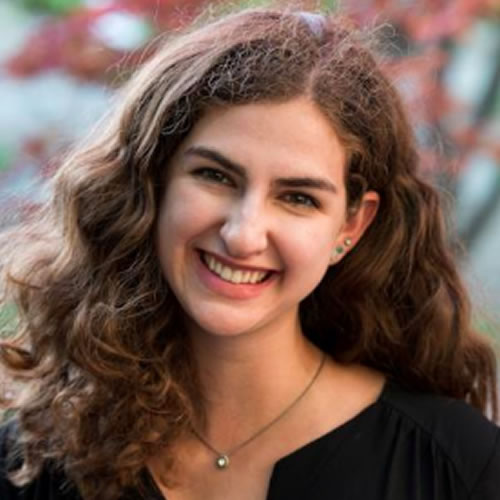SESSION 2: 11:45 AM - 1:15 PM
Panel D: Church, State, and Debate: Religion and Identity in Development
C100 Hesburgh Center Auditorium
Moderator: Fr. Bob Dowd, CSC
Religion’s Role in Evaluating Oregon’s Sanctuary Status
Morgan Peck, University of Notre Dame
Abstract
My project looks at the intersection of religion and politics in the arena of immigration policy. The specific policy measure in question, used as a representative of current immigration policy, is sanctuary law in Oregon, which is one of the few “sanctuary states” in the nation. In 2018, Oregon voters considered Measure 105 calling for the sanctuary law repeal and voted to uphold the state’s long-standing status. I explore how religion was used, both intentionally and subconsciously, in people’s idea-making processes and voting choices for the sanctuary law question, and how that fits into their general views of immigrant, using in-depth interviews as my data. Oregon as a state is majority unaffiliated religiously, which creates a context for religious persons to freely incorporate their religion into their civic interaction and understanding. I also test if the use of religion varies based on faith tradition, specifically looking at Catholics, mainline Protestants, evangelical Protestants, and Unitarian Universalists. I hypothesize that a person’s religious beliefs, as well as their interpretation of their obligations as a religious person, will affect their voting decision on the state sanctuary law. I also analyze the effects on their political beliefs from their congregation and clergy. I theorize that religious beliefs and congregations impact one’s views of the role of law, social justice, and immigrants, which then impact one’s vote on Measure 105. I am currently in the process of analyzing my data and producing results.
The Influence of Religion on Financial Preferences: Evaluating the Feasibility of Islamic Microfinance in Dakar, Senegal
Emily Pohl, University of Notre Dame
Abstract
While microfinance has emerged as a promising means of financially empowering the poor, the institutionalized model of distributing loans with interest is prohibited by Islam, which forbids both charging and paying interest. Despite the success of the Islamic banking industry and high demand for accessible microfinance in Muslim communities around the world, Islamic microfinance is only just beginning to develop in select countries and has yet to be institutionalized in Western Africa where Islam is the predominate religion. Using data collected from 100 in-depth interviews with Muslim community members, this study seeks to evaluate the degree to which religion factors into low-income individuals’ financial decision-making and to which Islamic microfinance is an accessible and viable option for the poor in Dakar, Senegal (in comparison to traditional MFIs). The results from this paper indicate both a high demand and need for Islamic microfinance in Dakar, with 75% of Muslims selecting Islamic loan contracts over conventional contracts and the majority of those respondents citing religious motivations for doing so.
Tribalism's Effect on Political Parties
Cyrus Lloyd, Vanderbilt
Abstract
Tribalism has been the fundamental organizational unit of Middle Eastern Society for thousands of years. Recently however, modern scholars have questioned the viability of tribalism in the burgeoning democratic systems of the region. This study weighs in on this debate, focusing specifically on how tribal loyalties influence the effectiveness of political parties, considered by political science researchers to be the most effective way for the people to impose their will on the government. Focusing specifically on Jordan, this research takes into account information collected from interviews with several prominent members of Jordanian political, social, and intellectual life, including the heads of several prominent political parties, and a tribal Sheikh, as well as existing research on both political parties and tribalism. It concludes that though tribalism is deeply ingrained in the Middle Eastern way of life, is not inherently at odds with democracy, and only hinders democratic systems, such as political parties, when tribal loyalties trump national ones. This is currently the case in Jordan because the country remains beholden to Western powers, and is thus less able to be responsive to the mandate of the people than the existing tribes. The recognition of this reality is important for future democratic development in the region, reformers must recognize the extant flaws in the present system in order to effectuate meaningful change.

Popular Piety, the Fruit of Culture
Emily Normand, University of Notre Dame
Abstract
The vast majority of migrants come steeped in the religious history of their home countries, carrying with them a diverse set of beliefs, philosophies, and practices. A large part of Latin American culture hinges upon the distinct suffusion of religiosidad popular translated ‘popular piety,’ which includes, but is not limited to religious processionals, festivals, saintly shrines, dances, and rituals (Scannone 2016). While deeply imbedded in the cultural history of Latin America from the tip of Patagonia to the US/Mexican border, the devotional practices are decidedly bereft from the United States. Puritanical foundations result in what is today the nebulous impression that any semblance to indigenous religiosity is undoubtedly condemnable as idol worship, magic, and syncretism of the unlearned people (Pelton 2018).
My historical account follows a chronological detailing of key events and figures on the subject of popular piety in the Latin American Church through the Puebla Conference of 1979 and touching upon current repercussions. My research is informed in part by my 2018 interview with Joaquín Alliende of Chile, which includes personal anecdotes, unique insights, and unprecedented commentary from a not-often identified ‘key-player’ in the discussion on popular piety. Though my historical account ends in 1979 with the Puebla conference, I conclude by proposing that a nuanced understanding of popular piety as a fruit of culture is essential for a justified and holistic interpretation of cross-cultural interactions prompted by migration to the US, specifically from Latin American countries.





